Free Choice and Sin: An Analysis of Anselm's Philosophical Ideas
VerifiedAdded on 2022/09/09
|6
|1710
|35
Essay
AI Summary
This paper provides an analysis of Anselm's philosophical arguments concerning free choice, focusing on his views on sin, temptation, and the human will. The author examines Anselm's arguments, rooted in religious underpinnings, particularly the Fall of Adam and Eve, to highlight that humans had the ability to choose between sin and righteousness. The paper explores Anselm's arguments, including the dilemma of human beings being able to sin or not, and the concept of God's freedom versus human free will. It delves into Anselm's perspective on the origins of vices and virtues, the implications of original sin, and the role of temptation. The author concludes that human actions, especially sins, originate from their freedom of choice, with individuals often choosing wrong over right due to temptation, as shown in his views before and after the Fall. References to scholarly articles are included.
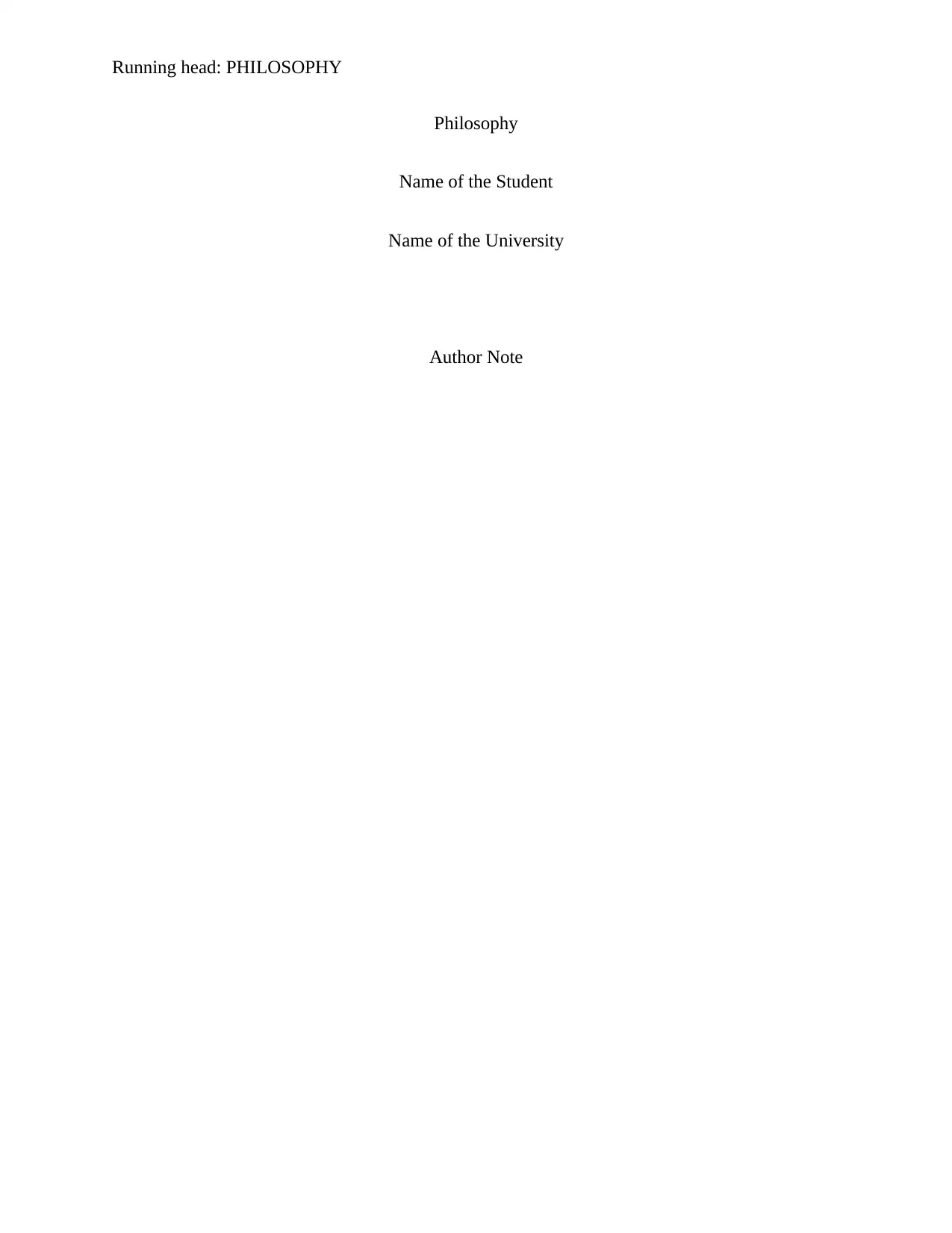
Running head: PHILOSOPHY
Philosophy
Name of the Student
Name of the University
Author Note
Philosophy
Name of the Student
Name of the University
Author Note
Paraphrase This Document
Need a fresh take? Get an instant paraphrase of this document with our AI Paraphraser
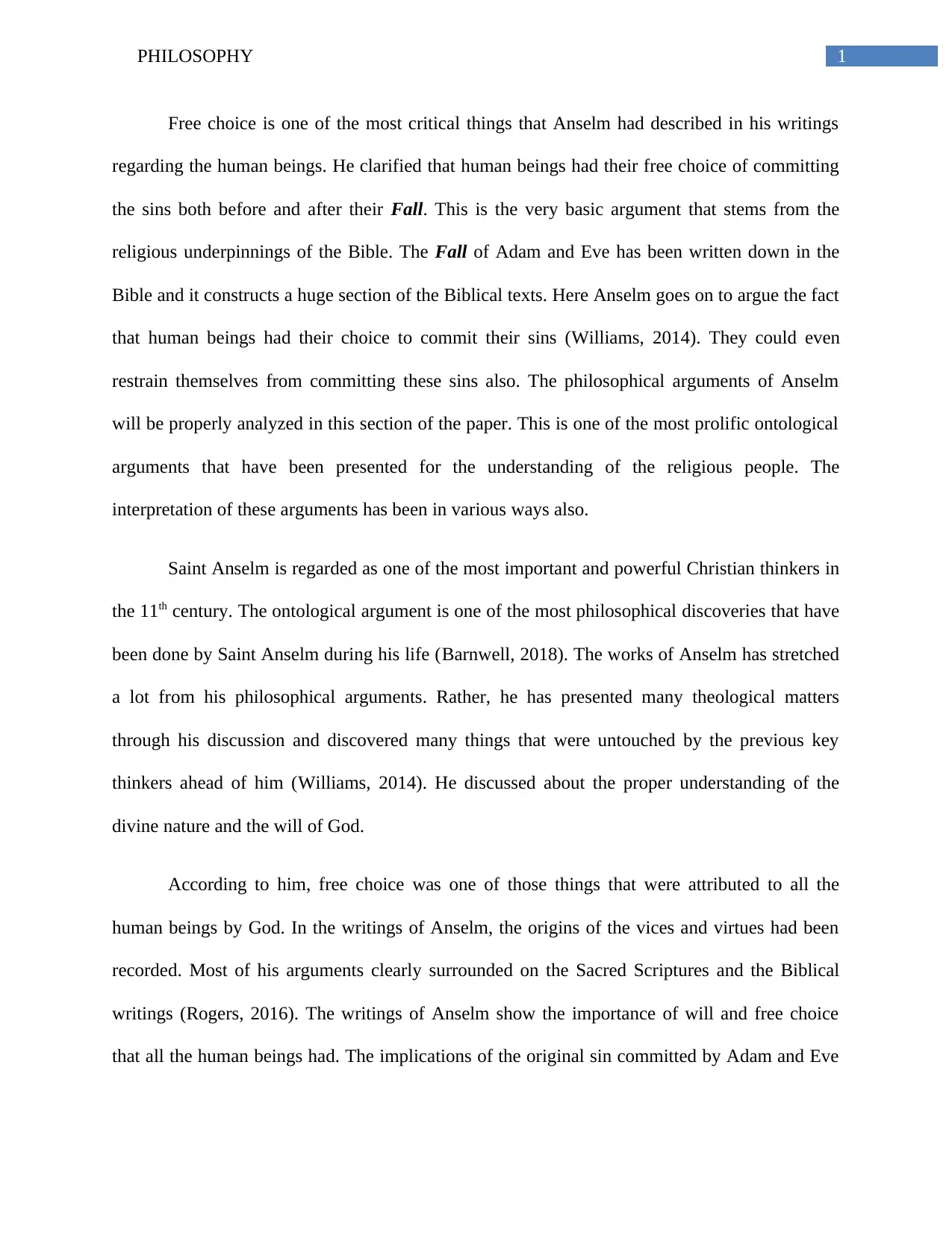
1PHILOSOPHY
Free choice is one of the most critical things that Anselm had described in his writings
regarding the human beings. He clarified that human beings had their free choice of committing
the sins both before and after their Fall. This is the very basic argument that stems from the
religious underpinnings of the Bible. The Fall of Adam and Eve has been written down in the
Bible and it constructs a huge section of the Biblical texts. Here Anselm goes on to argue the fact
that human beings had their choice to commit their sins (Williams, 2014). They could even
restrain themselves from committing these sins also. The philosophical arguments of Anselm
will be properly analyzed in this section of the paper. This is one of the most prolific ontological
arguments that have been presented for the understanding of the religious people. The
interpretation of these arguments has been in various ways also.
Saint Anselm is regarded as one of the most important and powerful Christian thinkers in
the 11th century. The ontological argument is one of the most philosophical discoveries that have
been done by Saint Anselm during his life (Barnwell, 2018). The works of Anselm has stretched
a lot from his philosophical arguments. Rather, he has presented many theological matters
through his discussion and discovered many things that were untouched by the previous key
thinkers ahead of him (Williams, 2014). He discussed about the proper understanding of the
divine nature and the will of God.
According to him, free choice was one of those things that were attributed to all the
human beings by God. In the writings of Anselm, the origins of the vices and virtues had been
recorded. Most of his arguments clearly surrounded on the Sacred Scriptures and the Biblical
writings (Rogers, 2016). The writings of Anselm show the importance of will and free choice
that all the human beings had. The implications of the original sin committed by Adam and Eve
Free choice is one of the most critical things that Anselm had described in his writings
regarding the human beings. He clarified that human beings had their free choice of committing
the sins both before and after their Fall. This is the very basic argument that stems from the
religious underpinnings of the Bible. The Fall of Adam and Eve has been written down in the
Bible and it constructs a huge section of the Biblical texts. Here Anselm goes on to argue the fact
that human beings had their choice to commit their sins (Williams, 2014). They could even
restrain themselves from committing these sins also. The philosophical arguments of Anselm
will be properly analyzed in this section of the paper. This is one of the most prolific ontological
arguments that have been presented for the understanding of the religious people. The
interpretation of these arguments has been in various ways also.
Saint Anselm is regarded as one of the most important and powerful Christian thinkers in
the 11th century. The ontological argument is one of the most philosophical discoveries that have
been done by Saint Anselm during his life (Barnwell, 2018). The works of Anselm has stretched
a lot from his philosophical arguments. Rather, he has presented many theological matters
through his discussion and discovered many things that were untouched by the previous key
thinkers ahead of him (Williams, 2014). He discussed about the proper understanding of the
divine nature and the will of God.
According to him, free choice was one of those things that were attributed to all the
human beings by God. In the writings of Anselm, the origins of the vices and virtues had been
recorded. Most of his arguments clearly surrounded on the Sacred Scriptures and the Biblical
writings (Rogers, 2016). The writings of Anselm show the importance of will and free choice
that all the human beings had. The implications of the original sin committed by Adam and Eve
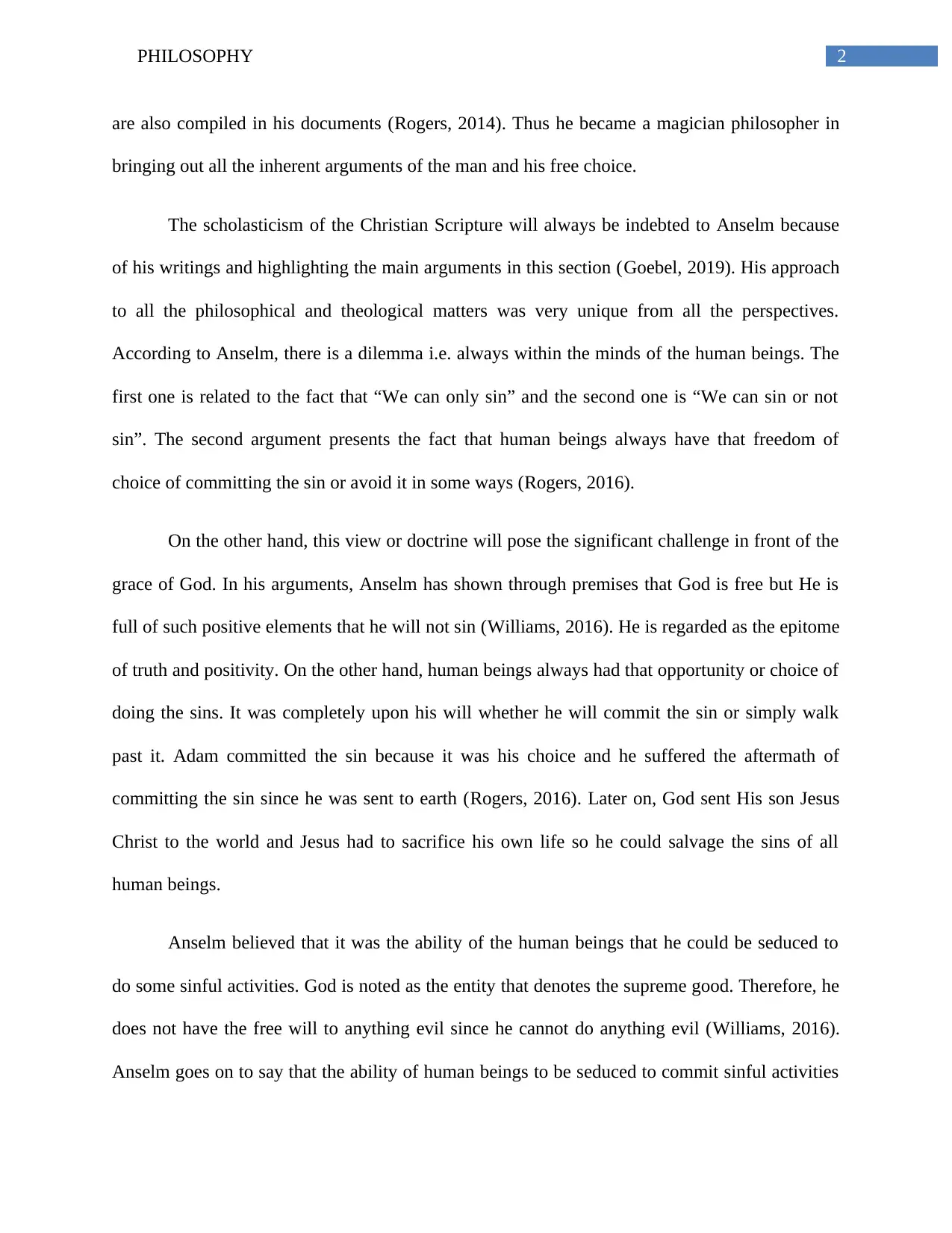
2PHILOSOPHY
are also compiled in his documents (Rogers, 2014). Thus he became a magician philosopher in
bringing out all the inherent arguments of the man and his free choice.
The scholasticism of the Christian Scripture will always be indebted to Anselm because
of his writings and highlighting the main arguments in this section (Goebel, 2019). His approach
to all the philosophical and theological matters was very unique from all the perspectives.
According to Anselm, there is a dilemma i.e. always within the minds of the human beings. The
first one is related to the fact that “We can only sin” and the second one is “We can sin or not
sin”. The second argument presents the fact that human beings always have that freedom of
choice of committing the sin or avoid it in some ways (Rogers, 2016).
On the other hand, this view or doctrine will pose the significant challenge in front of the
grace of God. In his arguments, Anselm has shown through premises that God is free but He is
full of such positive elements that he will not sin (Williams, 2016). He is regarded as the epitome
of truth and positivity. On the other hand, human beings always had that opportunity or choice of
doing the sins. It was completely upon his will whether he will commit the sin or simply walk
past it. Adam committed the sin because it was his choice and he suffered the aftermath of
committing the sin since he was sent to earth (Rogers, 2016). Later on, God sent His son Jesus
Christ to the world and Jesus had to sacrifice his own life so he could salvage the sins of all
human beings.
Anselm believed that it was the ability of the human beings that he could be seduced to
do some sinful activities. God is noted as the entity that denotes the supreme good. Therefore, he
does not have the free will to anything evil since he cannot do anything evil (Williams, 2016).
Anselm goes on to say that the ability of human beings to be seduced to commit sinful activities
are also compiled in his documents (Rogers, 2014). Thus he became a magician philosopher in
bringing out all the inherent arguments of the man and his free choice.
The scholasticism of the Christian Scripture will always be indebted to Anselm because
of his writings and highlighting the main arguments in this section (Goebel, 2019). His approach
to all the philosophical and theological matters was very unique from all the perspectives.
According to Anselm, there is a dilemma i.e. always within the minds of the human beings. The
first one is related to the fact that “We can only sin” and the second one is “We can sin or not
sin”. The second argument presents the fact that human beings always have that freedom of
choice of committing the sin or avoid it in some ways (Rogers, 2016).
On the other hand, this view or doctrine will pose the significant challenge in front of the
grace of God. In his arguments, Anselm has shown through premises that God is free but He is
full of such positive elements that he will not sin (Williams, 2016). He is regarded as the epitome
of truth and positivity. On the other hand, human beings always had that opportunity or choice of
doing the sins. It was completely upon his will whether he will commit the sin or simply walk
past it. Adam committed the sin because it was his choice and he suffered the aftermath of
committing the sin since he was sent to earth (Rogers, 2016). Later on, God sent His son Jesus
Christ to the world and Jesus had to sacrifice his own life so he could salvage the sins of all
human beings.
Anselm believed that it was the ability of the human beings that he could be seduced to
do some sinful activities. God is noted as the entity that denotes the supreme good. Therefore, he
does not have the free will to anything evil since he cannot do anything evil (Williams, 2016).
Anselm goes on to say that the ability of human beings to be seduced to commit sinful activities
⊘ This is a preview!⊘
Do you want full access?
Subscribe today to unlock all pages.

Trusted by 1+ million students worldwide
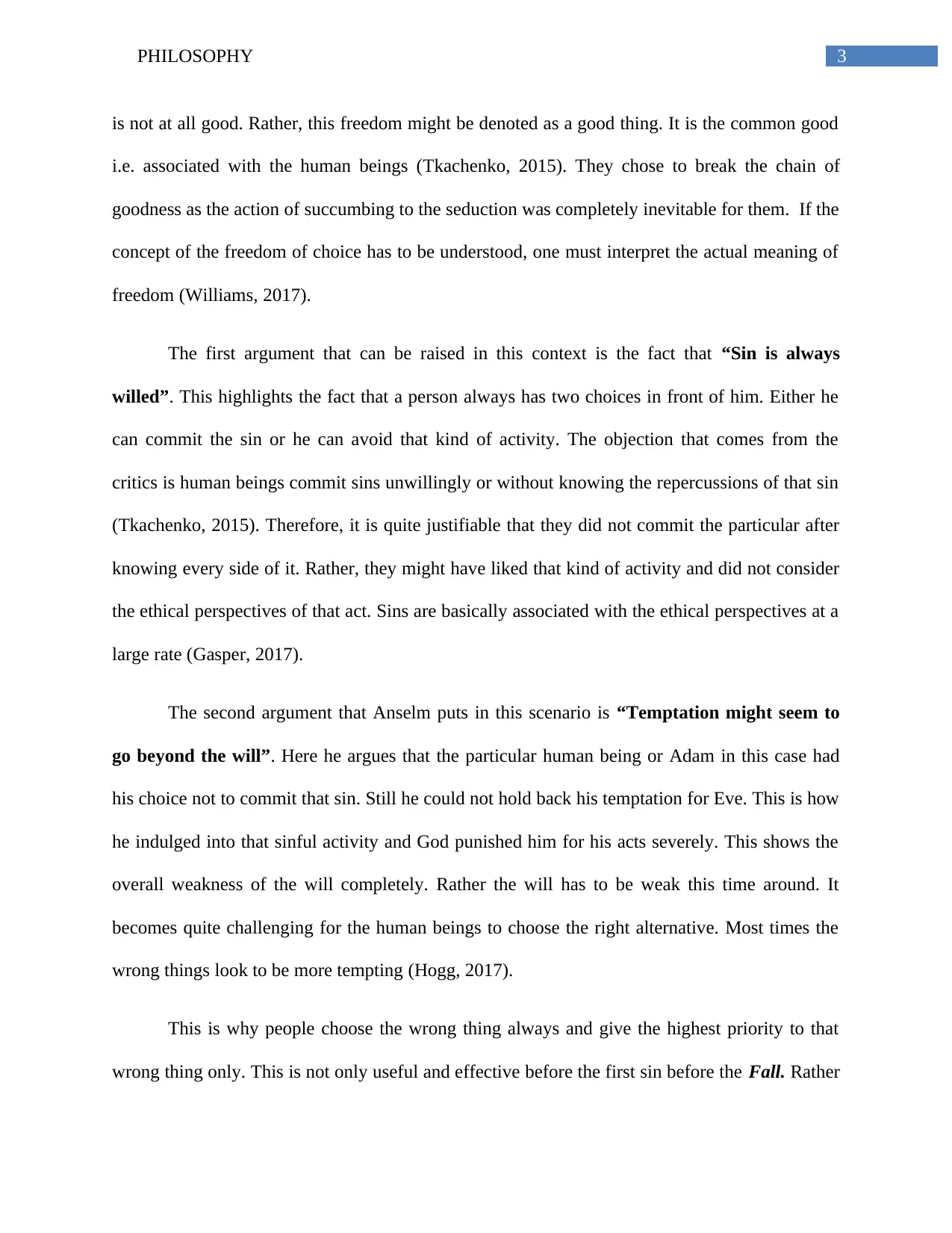
3PHILOSOPHY
is not at all good. Rather, this freedom might be denoted as a good thing. It is the common good
i.e. associated with the human beings (Tkachenko, 2015). They chose to break the chain of
goodness as the action of succumbing to the seduction was completely inevitable for them. If the
concept of the freedom of choice has to be understood, one must interpret the actual meaning of
freedom (Williams, 2017).
The first argument that can be raised in this context is the fact that “Sin is always
willed”. This highlights the fact that a person always has two choices in front of him. Either he
can commit the sin or he can avoid that kind of activity. The objection that comes from the
critics is human beings commit sins unwillingly or without knowing the repercussions of that sin
(Tkachenko, 2015). Therefore, it is quite justifiable that they did not commit the particular after
knowing every side of it. Rather, they might have liked that kind of activity and did not consider
the ethical perspectives of that act. Sins are basically associated with the ethical perspectives at a
large rate (Gasper, 2017).
The second argument that Anselm puts in this scenario is “Temptation might seem to
go beyond the will”. Here he argues that the particular human being or Adam in this case had
his choice not to commit that sin. Still he could not hold back his temptation for Eve. This is how
he indulged into that sinful activity and God punished him for his acts severely. This shows the
overall weakness of the will completely. Rather the will has to be weak this time around. It
becomes quite challenging for the human beings to choose the right alternative. Most times the
wrong things look to be more tempting (Hogg, 2017).
This is why people choose the wrong thing always and give the highest priority to that
wrong thing only. This is not only useful and effective before the first sin before the Fall. Rather
is not at all good. Rather, this freedom might be denoted as a good thing. It is the common good
i.e. associated with the human beings (Tkachenko, 2015). They chose to break the chain of
goodness as the action of succumbing to the seduction was completely inevitable for them. If the
concept of the freedom of choice has to be understood, one must interpret the actual meaning of
freedom (Williams, 2017).
The first argument that can be raised in this context is the fact that “Sin is always
willed”. This highlights the fact that a person always has two choices in front of him. Either he
can commit the sin or he can avoid that kind of activity. The objection that comes from the
critics is human beings commit sins unwillingly or without knowing the repercussions of that sin
(Tkachenko, 2015). Therefore, it is quite justifiable that they did not commit the particular after
knowing every side of it. Rather, they might have liked that kind of activity and did not consider
the ethical perspectives of that act. Sins are basically associated with the ethical perspectives at a
large rate (Gasper, 2017).
The second argument that Anselm puts in this scenario is “Temptation might seem to
go beyond the will”. Here he argues that the particular human being or Adam in this case had
his choice not to commit that sin. Still he could not hold back his temptation for Eve. This is how
he indulged into that sinful activity and God punished him for his acts severely. This shows the
overall weakness of the will completely. Rather the will has to be weak this time around. It
becomes quite challenging for the human beings to choose the right alternative. Most times the
wrong things look to be more tempting (Hogg, 2017).
This is why people choose the wrong thing always and give the highest priority to that
wrong thing only. This is not only useful and effective before the first sin before the Fall. Rather
Paraphrase This Document
Need a fresh take? Get an instant paraphrase of this document with our AI Paraphraser
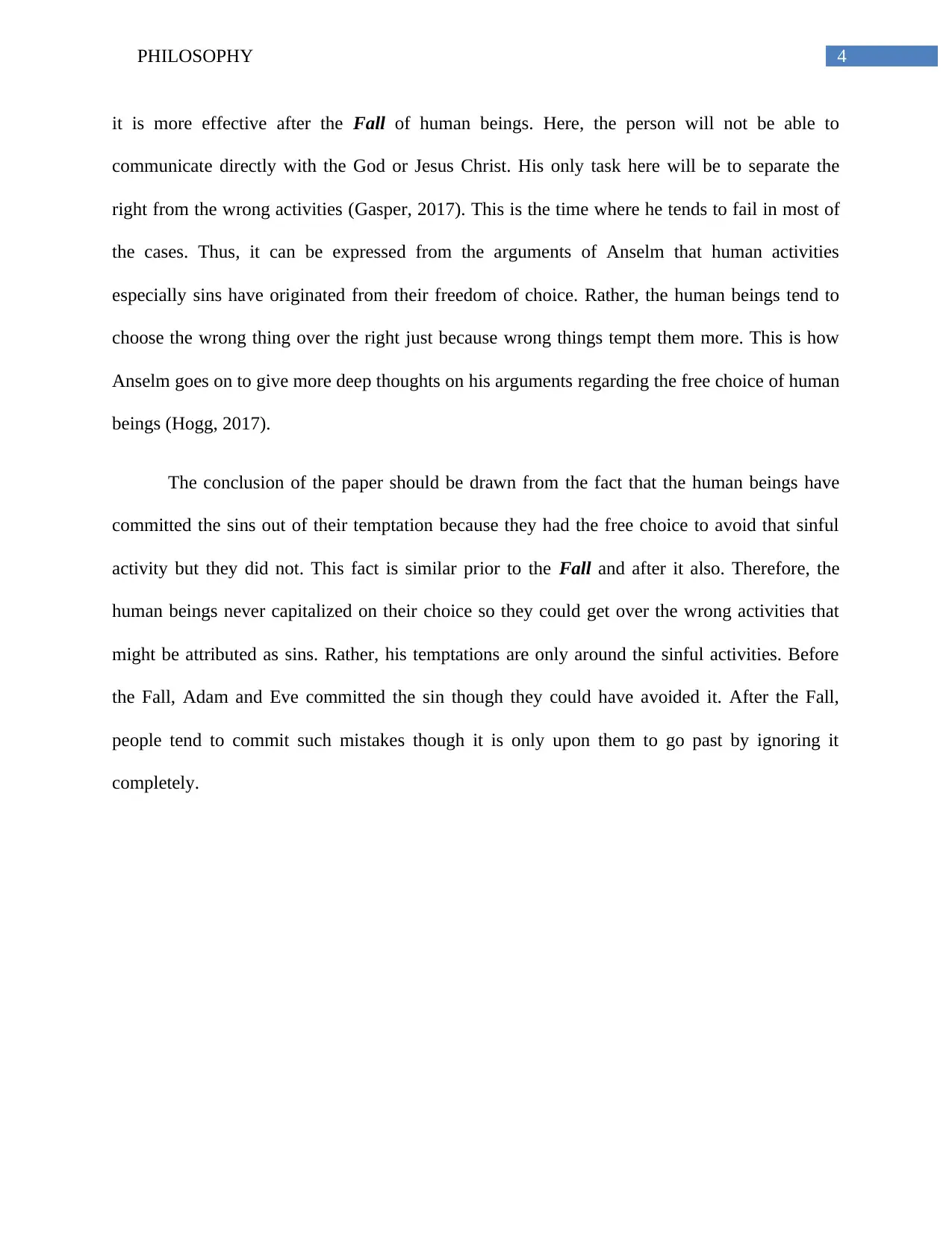
4PHILOSOPHY
it is more effective after the Fall of human beings. Here, the person will not be able to
communicate directly with the God or Jesus Christ. His only task here will be to separate the
right from the wrong activities (Gasper, 2017). This is the time where he tends to fail in most of
the cases. Thus, it can be expressed from the arguments of Anselm that human activities
especially sins have originated from their freedom of choice. Rather, the human beings tend to
choose the wrong thing over the right just because wrong things tempt them more. This is how
Anselm goes on to give more deep thoughts on his arguments regarding the free choice of human
beings (Hogg, 2017).
The conclusion of the paper should be drawn from the fact that the human beings have
committed the sins out of their temptation because they had the free choice to avoid that sinful
activity but they did not. This fact is similar prior to the Fall and after it also. Therefore, the
human beings never capitalized on their choice so they could get over the wrong activities that
might be attributed as sins. Rather, his temptations are only around the sinful activities. Before
the Fall, Adam and Eve committed the sin though they could have avoided it. After the Fall,
people tend to commit such mistakes though it is only upon them to go past by ignoring it
completely.
it is more effective after the Fall of human beings. Here, the person will not be able to
communicate directly with the God or Jesus Christ. His only task here will be to separate the
right from the wrong activities (Gasper, 2017). This is the time where he tends to fail in most of
the cases. Thus, it can be expressed from the arguments of Anselm that human activities
especially sins have originated from their freedom of choice. Rather, the human beings tend to
choose the wrong thing over the right just because wrong things tempt them more. This is how
Anselm goes on to give more deep thoughts on his arguments regarding the free choice of human
beings (Hogg, 2017).
The conclusion of the paper should be drawn from the fact that the human beings have
committed the sins out of their temptation because they had the free choice to avoid that sinful
activity but they did not. This fact is similar prior to the Fall and after it also. Therefore, the
human beings never capitalized on their choice so they could get over the wrong activities that
might be attributed as sins. Rather, his temptations are only around the sinful activities. Before
the Fall, Adam and Eve committed the sin though they could have avoided it. After the Fall,
people tend to commit such mistakes though it is only upon them to go past by ignoring it
completely.
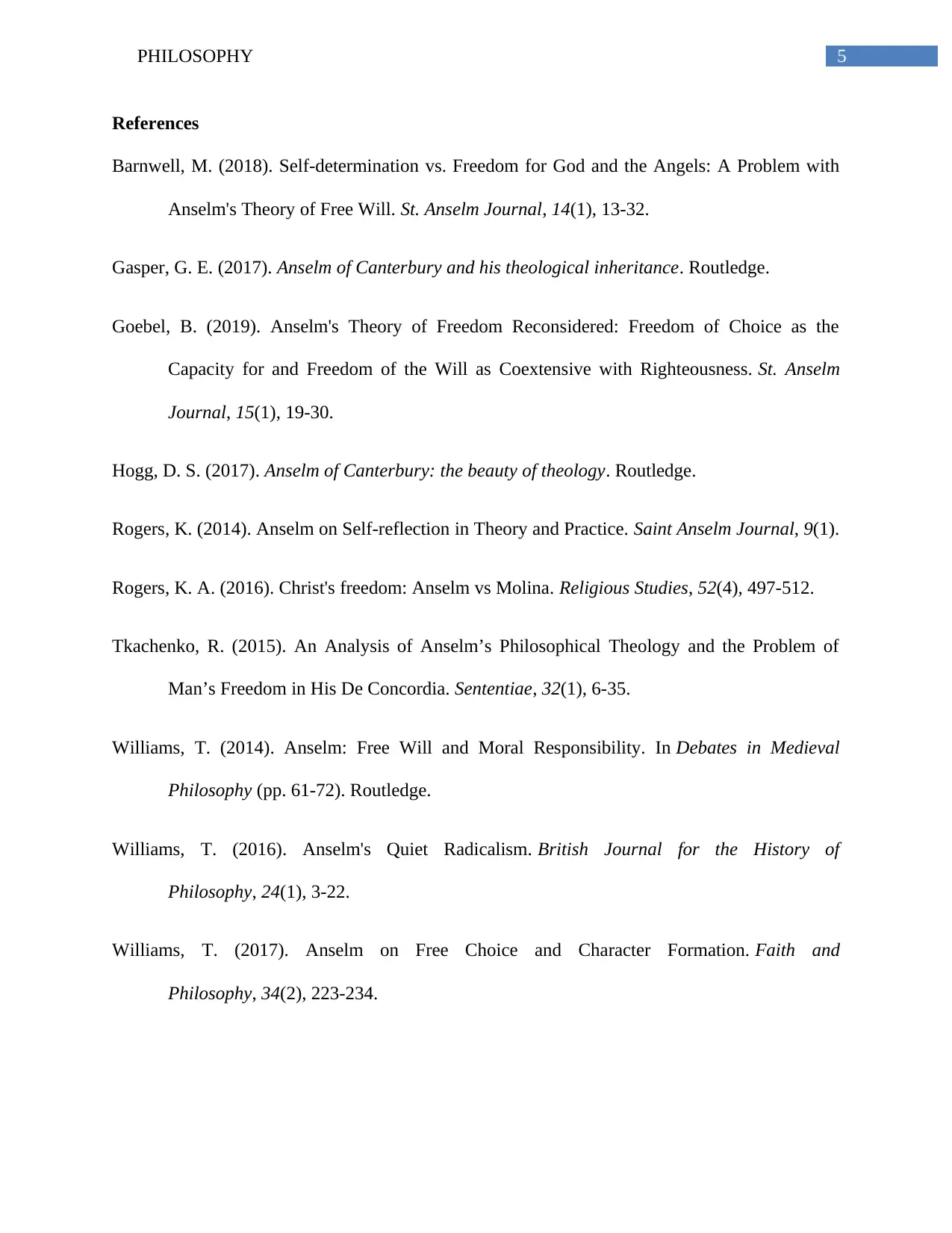
5PHILOSOPHY
References
Barnwell, M. (2018). Self-determination vs. Freedom for God and the Angels: A Problem with
Anselm's Theory of Free Will. St. Anselm Journal, 14(1), 13-32.
Gasper, G. E. (2017). Anselm of Canterbury and his theological inheritance. Routledge.
Goebel, B. (2019). Anselm's Theory of Freedom Reconsidered: Freedom of Choice as the
Capacity for and Freedom of the Will as Coextensive with Righteousness. St. Anselm
Journal, 15(1), 19-30.
Hogg, D. S. (2017). Anselm of Canterbury: the beauty of theology. Routledge.
Rogers, K. (2014). Anselm on Self-reflection in Theory and Practice. Saint Anselm Journal, 9(1).
Rogers, K. A. (2016). Christ's freedom: Anselm vs Molina. Religious Studies, 52(4), 497-512.
Tkachenko, R. (2015). An Analysis of Anselm’s Philosophical Theology and the Problem of
Man’s Freedom in His De Concordia. Sententiae, 32(1), 6-35.
Williams, T. (2014). Anselm: Free Will and Moral Responsibility. In Debates in Medieval
Philosophy (pp. 61-72). Routledge.
Williams, T. (2016). Anselm's Quiet Radicalism. British Journal for the History of
Philosophy, 24(1), 3-22.
Williams, T. (2017). Anselm on Free Choice and Character Formation. Faith and
Philosophy, 34(2), 223-234.
References
Barnwell, M. (2018). Self-determination vs. Freedom for God and the Angels: A Problem with
Anselm's Theory of Free Will. St. Anselm Journal, 14(1), 13-32.
Gasper, G. E. (2017). Anselm of Canterbury and his theological inheritance. Routledge.
Goebel, B. (2019). Anselm's Theory of Freedom Reconsidered: Freedom of Choice as the
Capacity for and Freedom of the Will as Coextensive with Righteousness. St. Anselm
Journal, 15(1), 19-30.
Hogg, D. S. (2017). Anselm of Canterbury: the beauty of theology. Routledge.
Rogers, K. (2014). Anselm on Self-reflection in Theory and Practice. Saint Anselm Journal, 9(1).
Rogers, K. A. (2016). Christ's freedom: Anselm vs Molina. Religious Studies, 52(4), 497-512.
Tkachenko, R. (2015). An Analysis of Anselm’s Philosophical Theology and the Problem of
Man’s Freedom in His De Concordia. Sententiae, 32(1), 6-35.
Williams, T. (2014). Anselm: Free Will and Moral Responsibility. In Debates in Medieval
Philosophy (pp. 61-72). Routledge.
Williams, T. (2016). Anselm's Quiet Radicalism. British Journal for the History of
Philosophy, 24(1), 3-22.
Williams, T. (2017). Anselm on Free Choice and Character Formation. Faith and
Philosophy, 34(2), 223-234.
⊘ This is a preview!⊘
Do you want full access?
Subscribe today to unlock all pages.

Trusted by 1+ million students worldwide
1 out of 6
Related Documents
Your All-in-One AI-Powered Toolkit for Academic Success.
+13062052269
info@desklib.com
Available 24*7 on WhatsApp / Email
![[object Object]](/_next/static/media/star-bottom.7253800d.svg)
Unlock your academic potential
Copyright © 2020–2026 A2Z Services. All Rights Reserved. Developed and managed by ZUCOL.





